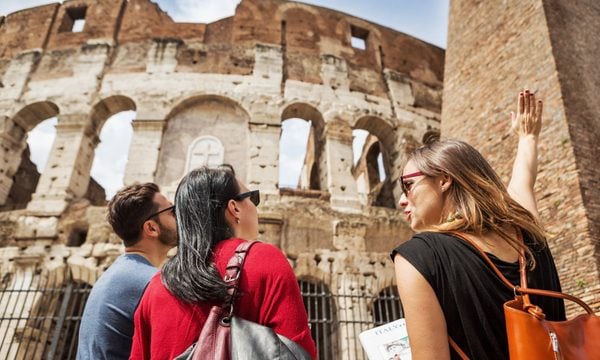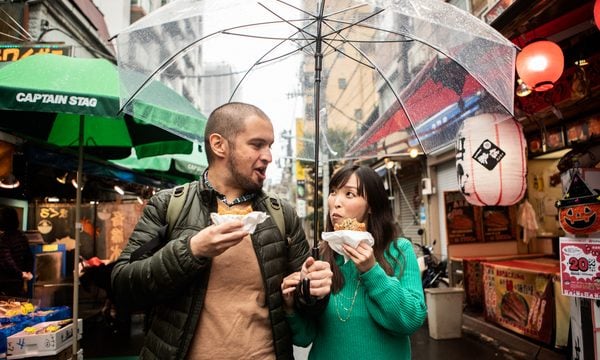What Does Duty-Free Mean?
Compare prices, be aware of exemption limits and follow the liquids rules to get the most from duty-free shopping.

Many or all of the products on this page are from partners who compensate us when you click to or take an action on their website, but this does not influence our evaluations or ratings. Our opinions are our own.
The maze of liquor bottles, cartons of cigarettes and cosmetics racks that you walk through after passing immigration can seem never-ending, especially when you're low on cash after your vacation.
However, these duty-free shops can provide great deals on goods that usually incur high taxes.
Here’s what you should know about duty-free stores and tips to follow when shopping for duty-free goods.
What is duty-free?
Duty is the tax added to purchased goods. It could be a value-added tax, consumption tax or import tax. "Duty-free" means without tax and refers to purchasing merchandise at cost without an additional tax.
Get the 'Cheat Codes' to Cheaper Travel
Unlocking the secret to saving a ton on travel is easier than you think. 📤 Our free newsletter shows you how in 5 min. or less.

What is a duty-free store?
A duty-free store allows you to purchase alcohol, perfume, cigarettes, chocolates and other popular items without any added taxes. In an airport, its usually located after you pass immigration, meaning you have access to a duty-free store when you're an international traveler.
🤓 Nerdy Tip
You also can find duty-free stores on a cruise ship or at a seaport. A duty-free shop aboard a cruise ship usually doesn’t open until the vessel is out at sea where local tax laws don’t apply. To make a purchase, you need a boarding pass, which gets scanned at the register along with your items. This is done to prevent the locals who work at the airport from purchasing goods without paying taxes.
The destination listed on your boarding pass also determines your purchase allowance and ensures you're not purchasing items prohibited in the country you're traveling to.
After you pass immigration in an airport, you enter a geopolitical "no man’s land," or a transit zone. Because you technically have "left" the country you're physically in, that country’s laws regarding taxation no longer apply. The same idea applies to airports where you have a connecting flight — you can buy duty-free products in the terminal during your layover because you’re in the transit zone.
You can often take your items with you, but in some cases, depending on the airline, the duty-free merchandise is distributed to passengers at the boarding gate.
Some duty-free shops are located in the arrivals terminal, meaning you can stock up on alcohol or cigarettes when you land in a country that imposes high taxes on these items.
How does duty-free work?
Let’s say you buy perfume at Galeries Lafayette Champs-Elysées on your trip to Paris. Because the popular shopping area is located outside of the airport, you’re likely to pay a value-added tax on this purchase. Furthermore, you may have to pay an import duty on the same perfume once you land in the United States (depending on if your acquired articles exceed your exemption/allowance).
If you buy this perfume at a duty-free shop at Paris Charles de Gaulle Airport, you don’t have to pay value-added tax on this perfume (however, depending on the cost, you might still be on the hook to pay tax when you return to the United States).
The U.S. Customs and Border Protection (CBP) has tax-free exemptions for up to $1,600 worth of goods, depending on the country you visited and the length of your stay, so long as the goods you purchased are for personal use. If you don’t intend to resell it back home, you won’t have to pay taxes, even though the merchandise is crossing international borders.
Tips for duty-free shopping
You need to follow certain rules when shopping at a duty-free store.
Be mindful of the exemption limit
Whenever you purchase alcohol or tobacco, make sure to check the types of exemptions listed by the CBP and when they apply. Different exemptions apply, depending on where you visited and how long you were out of the country.
The CBP travel exemptions allow you to bring back a certain amount of goods duty-free (without paying taxes) when you enter the United States. The exemption amount varies and depends on where you're coming from.
- $200: This is the minimum exemption for everyone, regardless of where they're traveling from.
- $800: This applies to most travelers from anywhere other than a U.S. insular possession (U.S. Virgin Islands, Puerto Rico, Guam or American Samoa), as well as travelers to the U.S. from the Caribbean and certain South American countries.
- $1600: This applies to returning U.S. residents coming back directly from a U.S. insular possession.
There are also limits for certain items like cigarettes and fluid ounces of alcohol. See the full list of regulations here.
Follow carry-on liquid rules
If you buy a bottle of alcohol at a duty-free store before entering the U.S. and your flight isn’t direct to your final destination airport, don’t worry. You can bring it back even if you have a layover.
The alcohol you purchased at a duty-free shop is allowed in your carry-on bag if:
- It’s between 24% and 70% ABV (48 to 140 proof).
- It’s in a clear and secure bag packaged by the retailer. If the bag looks opened or tampered with, it will be taken away.
- You have the receipt showing you purchased it in the last 48 hours.
Know the price before you buy
Even though the goods you find at a duty-free store don’t include tax, the prices can still be high.
If you have the time, compare the pricing of the goods you want to purchase in your home country, in your destination country and at a duty-free shop. In some cases, the savings will be negligible, and in others, it will be substantial.
Purchase with the right credit card
Because most of your purchases will likely be abroad, make sure to use a credit card without foreign transaction fees.
» Learn more: The best travel credit cards right now
Duty-free shopping recapped
Duty-free shopping is a great way to purchase select goods without taxes. These stores are usually available for international travelers in transit zones, where local tax laws are exempt.
However, to ensure that your duty-free shopping experience is successful, make sure to compare prices ahead of time, follow the carry-on liquid rules and know the import allowances in your destination country.
How to maximize your rewards
You want a travel credit card that prioritizes what’s important to you. Here are some of the best travel credit cards of 2026:
- Flexibility, point transfers and a large bonus: Chase Sapphire Preferred® Card
- No annual fee: Wells Fargo Autograph® Card
- Flat-rate travel rewards: Capital One Venture Rewards Credit Card
- Bonus travel rewards and high-end perks: Chase Sapphire Reserve®
- Luxury perks: American Express Platinum Card®
- Business travelers: Ink Business Preferred® Credit Card
Article sources
NerdWallet writers are subject matter authorities who use primary,
trustworthy sources to inform their work, including peer-reviewed
studies, government websites, academic research and interviews with
industry experts. All content is fact-checked for accuracy, timeliness
and relevance. You can learn more about NerdWallet's high
standards for journalism by reading our
editorial guidelines.
Limited Time Only: Earn $1,000 Toward Travel!
Capital One Venture Rewards Credit Card 
Travel

For a limited time, the
Capital One Venture Rewards Credit Card is offering new cardholders an especially rich bonus: Enjoy $250 to use on Capital One Travel in your first cardholder year, plus earn 75,000 bonus miles once you spend $4,000 on purchases within the first 3 months from account opening - that’s equal to $1,000 in travel!
More like this
Related articles







